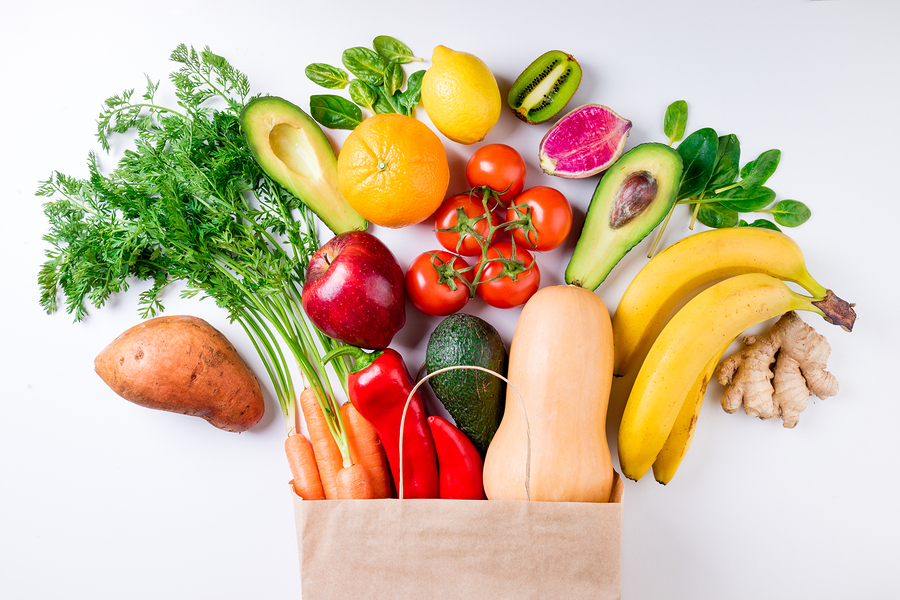Moving away from meat
With vegetarian food becoming increasingly popular how can we be sure we are getting our daily requirement of protein?
Recent figures suggest that 33.5% of us Brits are reporting to be either cutting down or completely cutting out meat and 21% of us are adopting a largely vegetarian diet with the occasional consumption of meat – otherwise known as being a flexitarian. This poses the question of how we go about replacing the protein content in our diet.
AXA PPP healthcare physiologist Anna Fountain explains that being a vegetarian or flexitarian does not necessarily mean we should be deficient in protein.
Protein explained
Protein is needed for the growth and repair of our body and its muscles. The protein in our diets derives from amino acids and 8 of these amino acids our body can only get by consuming through food.
There is a concern that by eliminating meat from our diet we will lose out on the essential levels of protein that we need.
Anna points out “meals don’t have to contain meat in order to be tasty and nutritionally beneficial! There are plenty of ways to make sure that our meals and snacks contain the right amount of protein needed on a day to day basis.”
The options for alternatives to meat are ever growing and can lead to confusion similar to the various substitutes for cows’ milk currently available – just the sheer variety of dairy free alternatives can leave us feeling baffled and so trying to get the right amount of protein in our diet can leave us feeling similarly frustrated.
Keep it simple
When starting to look at replacing meat in our diet the trick is to keep it simple. There is a current trend towards ‘meat free Mondays’ which is a fun way to ease gently into a more vegetarian led lifestyle. So, whether you include meat in your diet or not, as long as your diet is well constructed then you should be getting sufficient levels of protein
Benefits of a vegetarian diet
Eating a purely vegetarian diet can be enormously beneficial as long as you are including the nutrients and levels of protein your body needs.
Becoming a vegetarian can reduce your body mass and LDL cholesterol levels. Blood sugar and blood pressure levels have also been shown to decrease which may contribute towards a reduction in heart disease, diabetes and cancer.
Risks of a vegetarian diet
The key to following a vegetarian diet is to replace meat with other ingredients which provide the important nutrients your body needs. If a vegetarian diet is not properly constructed then the result may be protein deficiency, lack of iron (anaemia) and other nutrient deficiencies.
How much is enough?
Replacing meat with cheese, milk and eggs will give a good balance of essential amino acids but relying solely on these may lead to a diet full of too many saturated fats and not enough iron. It is therefore very important to make sure a range of vegetarian sources of protein is eaten throughout the day.
The recommended nutrient Intake (RNI) for protein is 0.75g per kg of body weight for adults, though this may vary depending on individual circumstances, as the amount of exercise you undertake will also play a key part in determining how much protein you need. For instance, if you are endurance training then your protein requirements may be 1.2-1.4g per kg per day and strength training will be even higher.
How much I am getting?
In order to determine where to get the protein intake in your diet it’s useful to compare the following foods:
- 100g chicken breast has around 30g of protein
- Tofu has around 12g of protein per 100g
- 2 medium sized boiled eggs have around 14g of protein
These amounts are approximate and it is always a good idea to check the nutrition values indicated on the food labels as it is important to be sure that you are getting the right quantities for you.
A low down on meat alternatives
Many meat alternatives will provide good amounts of protein such as:
- Pulses (including beans, peas and lentils) – these are inexpensive, high in fibre and a source of iron too. Be careful though, as these often contain added salt and sugar, especially the varieties sold in cans
- Eggs – quick, easy and affordable
- Cereals (such as oats, barley, rice and quinoa) – all good sources especially quinoa which is classed as a complete protein as it has all the essential amino acids the body requires
- Tofu – a soya protein and a versatile ingredient
- Meat substitute labelled foods such as vegetarian sausages – high in protein but watch out as may be high in salt too
- Nuts and seeds – handy but high in fat and therefore high in calories
- Dairy products – packed full of calcium alongside protein but can contain high amounts of saturated fats and calories, so try and choose reduced fat options but be wary of the high sugar content that can come with low-fat dairy products
- Wholegrain breads, rice and pasta have more protein, fibre and iron than their white alternatives.
By choosing carefully there is no reason why a vegetarian diet should not have the right amount of protein to meet all your body’s dietary needs.
And, if you’re looking for some recipe inspiration, why not check out our vegetable chilli or browse the Silversurfer’s vegetarian recipes here.
Disclaimer
All content on Silversurfers.com is provided for general information only, and should not be treated at all as a substitute for the medical advice of your own doctor or any other health care professional. Silversurfers will not be responsible or liable for any diagnosis made by a user based on the content on www.silversurfers.com and we are also not liable for the content of any external websites or links from or to Silversurfers to any other websites. Please always consult your own doctor if you’re in any way concerned about any aspect of your health.
Melina - Assistant Editor
Latest posts by Melina - Assistant Editor (see all)
- Banana bread with SunGold kiwis - February 20, 2025
- A tribute to Bob Marley - February 4, 2025
- Going to Work on an Egg! - January 29, 2025
- The Very Best of Petula Clark - January 14, 2025
- 50 Years of Coat Trends - January 12, 2025




















